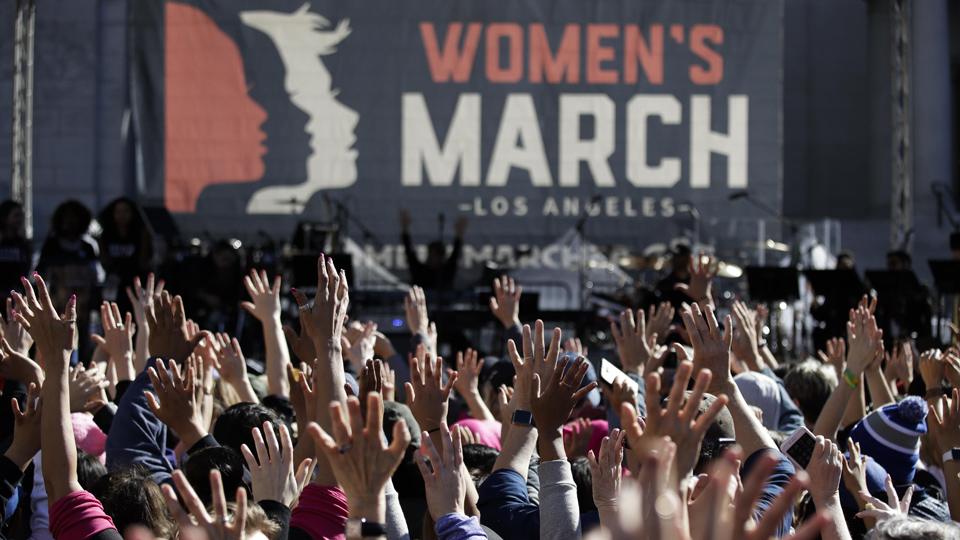
LOS ANGELES — The struggle for lasting systemic change has been put center stage in mainstream media by the #MeToo and #TimesUp campaigns. These campaigns have benefited from women in entertainment putting them in the spotlight.
It was fitting then that the January 20 Women’s March in Los Angeles, with Hollywood as the epicenter of entertainment, gave heavy focus to the cause of gender equality, while acknowledging that the next step is taking the sentiment behind these campaigns to the polls.
The march in Los Angeles, organized by the Women’s March LA Foundation, was part of a day of marches across the country. Last year, millions of women and their allies took to the streets in solidarity for the rights of women around the world. Now, a year after Donald Trump has taken office as the so-called “leader of the free world,” (even as accusations of sexual assault and treason swirl around him), millions took to the streets again, this time aiming to put the focus on the 2018 midterm elections.
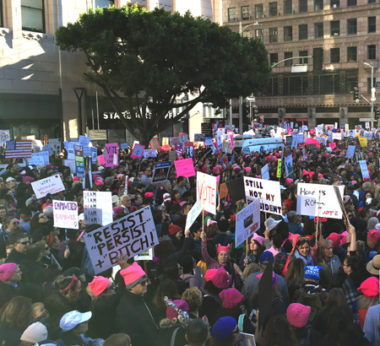
The speakers urged participants to use their vote in order to help build a government that reflects women’s needs, they called for a detrmined battle against any attempts to resrict the the vote and they argued for a plan of action leading up to the midterm November, 2018 elections and beyond.
The event kicked off in Pershing Square, followed by the march itself, which culminated in Grand Park, where a number speakers and musical performers took to the stage.
Actresses Eva Longoria, Natalie Portman, and Constance Wu opened up the afternoon program. Longoria, an advocate for immigrant rights and initiator of the Latino Victory Project, noted that “people thought last year was just a march, or just a moment. This is a movement.”
She went on to state, “We have endured a year of racist and sexist rhetoric from the White House. Your presence here today matters. Those in power seemed to have turned their backs on reason and logic. It extends beyond a political actor or party… We’re calling for a systemic change that threatens the corporate bottom line and elected positions.”
She went connected the #TimesUp campaign to the power of the vote. “With #TimesUp it doesn’t matter where your workplace is. The call is universal. In this movement we have the world’s attention. What do we do with that? We vote… The American people will decide. Your vote is the most powerful individual tool at your disposal. If you want to be heard, you need to vote… Today we march, tomorrow we march on, and make our words count.”
Wu and Portman spoke about the sexual harassment they’ve experienced throughout the years of their careers. Portman expressed that the way to combat sexual terrorism and to achieve true “female desire and sexuality” was to reach a world where genders were equal and sexual violence and abuse was a thing of the past. Wu noted that the movement for women’s rights was not about catering to men who might feel uncomfortable, but about giving women the chance to feel safe to be who they are.
Actress Alfre Woodard took to the stage with a rallying speech calling for a recommitment to combat injustice. “Yesterday we were shocked, but today we are wiser,” Woodard said, referring to the election of Donald Trump. “Our democracy depends on this. We need to get people registered and ready to roll. We can’t wait… Like our elders in the South used to say, ‘freedom ain’t free. It has to be fought for and protected constantly.’.. Get out of your comfort zones. We don’t have to reinvent the wheel [with these elections], we just have to keep it rolling. The 2018 Midterm elections start now,” Woodard concluded.
Oscar-winning actress Viola Davis introduced Los Angeles Mayor Eric Garcetti. Before passing the mic to the mayor Davis said, “Like Martin Luther King Jr. once said, I’m not ready to wait 100-200 years for things to change. Change is not inevitable. We have to work to move forward.
“We fell asleep. We fell asleep when we were moving forward and not looking to our right and our left to see who we were leaving behind… We have to be inclusive. One in five women will be sexually assaulted before the age of 18… I stand up for the women who are still silent, faceless, and without the money or image in the media to give them the confidence to break their silence… It is not just our job as Americans to fight for our rights, but for everyone’s rights… We stand on the shoulders of the originators of the #MeToo movement. Like Fannie Lou Hamer, Recy Taylor, and Rosa Parks… I hope we never go back. It’s not just about clapping [and marching], but keeping it going as you go home.”
Los Angeles Mayor Eric Garcetti referenced Los Angeles’ long history. “We are a city older than Washington D.C. and we are ready to lead,” Garcetti said. “Women should be everywhere, not just somewhere.”
Speaking to the men in the large crowd he noted, “Men, this must be your cause too. Stop dismissing locker room talk. It’s not just locker room talk. Don’t keep saying you’re doing this for your sisters, daughters, and mothers. Do it for yourself… We need women to thrive so we all can survive.”
Ending his speech, he spoke directly to members of congress and Donald Trump.:
“To those members of congress who want to take our healthcare, you’re out of here. Mr. President, you might know how to shut down the government, but we know how to light things up. You may know how to tweet, but we own these streets.”
Civil rights advocate Kimberlé Williams Crenshaw and Black Lives Matter’s Melina Abdullah gave speeches focusing on the role Black women have played in politics, the fight for justice, and the need for intersectional views when speaking on women’s rights.
Professor Melina Abdullah said, “Last year white people elected a sexist, racist, capitalistic fool to the White House. It’s on you [white people] to fix this sh*t.” She went on to state, “We are winning because of Black women. Tarana Burke didn’t just hashtag the #MeToo movement. She went out and organized. Ninety-seven percent of Black women in Alabama decided they weren’t going to let a racist child molestor get into the Senate… Commit to trust Black women, but do more than trust us. Support us, because the work we do is for our lives. We need your voice. Black lives will always matter. We need you to show up, not just today,” Abdullah concluded.
“Some are worried that if we talk about our differences it will distract from what we’re fighting for,” Crenshaw began. “I’m a Black woman. I’m going to talk about Black women and intersectionality… When we miss things it hurts us. Did you know that the people who lost their right to vote was larger than the margin that determined the outcome of the last presidential election,” Crenshaw asked the crowd.
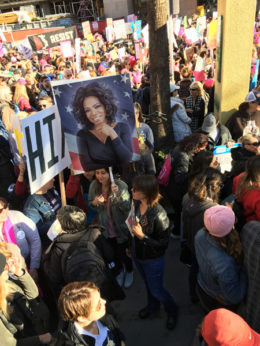
Speaking to the gutting of the Voting Rights Act, and the divisions of race and gender, Crenshaw continued, “Black women fought back. Black women led the fight against sexual harassment. Recy Taylor being raped wasn’t what changed history, it was her refusal to stay silent about it [that changed things]… Rosa Parks didn’t stumble into history. She was an activist who fought for Black women and equality. And there were so many others [like them] that refused to be divided and conquered… We have to weave a tapestry of resistance out of our differences.” Crenshaw finished her speech by proclaiming to the crowd, “Find your inner Black woman, and vote.”
Mayor Garcetti gave the official number for march attendees as an estimated 500,000, making it arguably one of the largest women’s marches in the nation for the day.

MOST POPULAR TODAY


Zionist organizations leading campaign to stop ceasefire resolutions in D.C. area

High Court essentially bans demonstrations, freedom of assembly in Deep South

Afghanistan’s socialist years: The promising future killed off by U.S. imperialism

Communist Karol Cariola elected president of Chile’s legislature


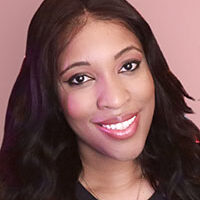
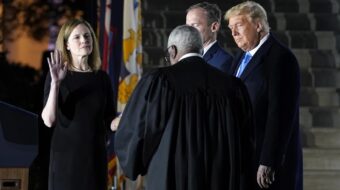

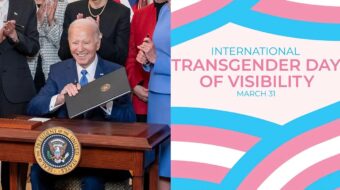
Comments